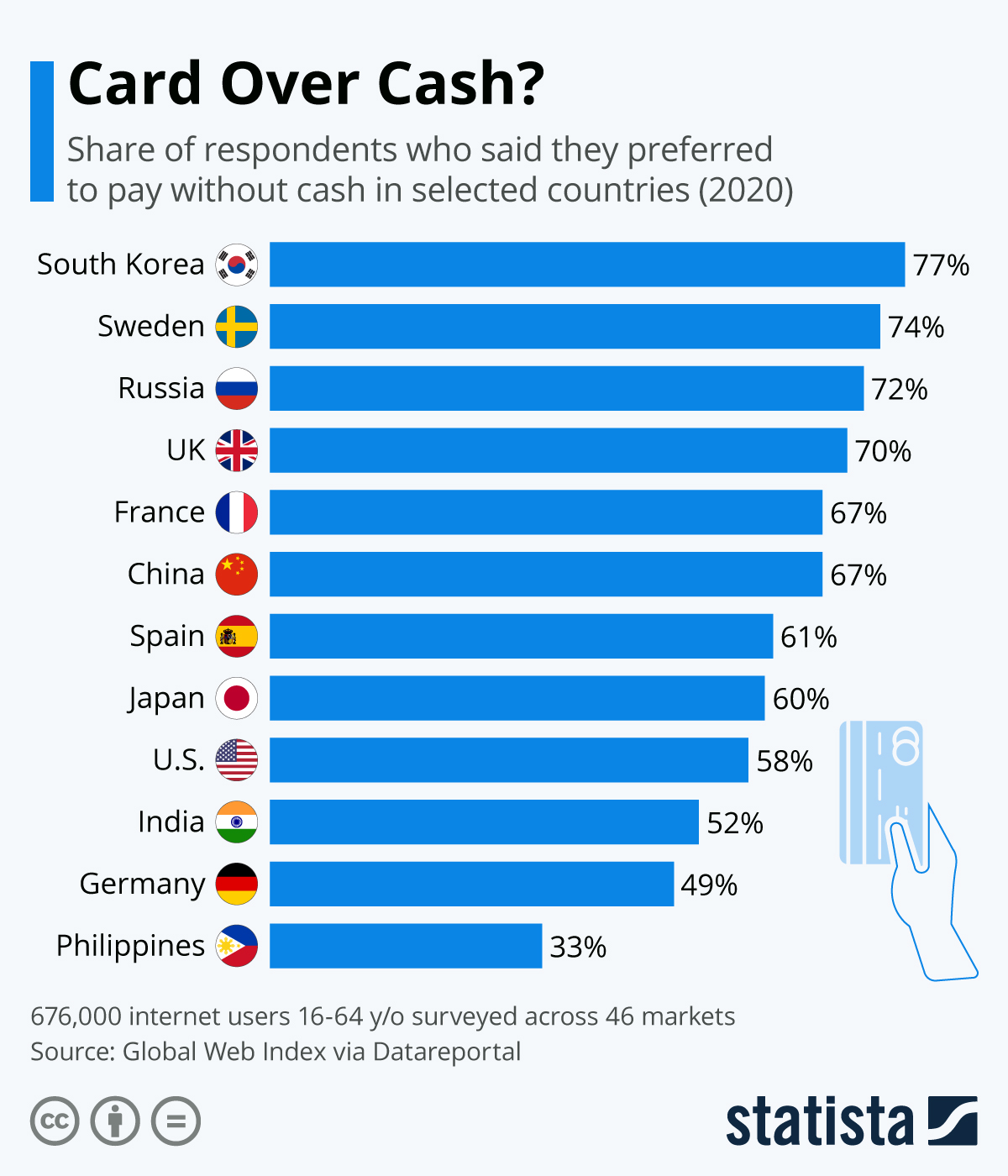Topics: Οργανωσιακή Θεωρία και Συμπεριφορά (Organizational Behavior), Επιχειρηματικότητα (Entrepreneurship), Εταιρική Κοινωνική Ευθύνη (Corporate Social Responsibility), Strategic Management, Leadership , Organizational Culture and Change
Παρασκευή 29 Ιανουαρίου 2021
2020 JUST Capital Year in Review. Stakeholder Capitalism: ‘The Fierce Urgency of Now’
Πέμπτη 28 Ιανουαρίου 2021
How Can Students Make Themselves ‘Work Ready’ at University?
Δευτέρα 25 Ιανουαρίου 2021
Inequality: A persisting challenge and its implications (McKinsey.com)
Παρασκευή 22 Ιανουαρίου 2021
Robo-Dancing from Boston Dynamics ( 2 min Video)
https://www.youtube.com/watch?v=fn3KWM1kuAw&utm_source=morning_brew
Πέμπτη 21 Ιανουαρίου 2021
2020 Drucker Institute Company Ranking
https://www.drucker.institute/2020-drucker-institute-company-ranking/
Card Over Cash? (STATISTA jan 21 2021)
It remains to be seen if card payments still catch on in some developing countries. In places where payment cards are not yet widespread, phone payments can actually spread quicker, creating a leapfrog effect of the population migrating straight from cash to mobile wallets and other phone payments.


Παρασκευή 15 Ιανουαρίου 2021
Putting people at the heart of public-sector transformations
https://www.mckinsey.com/industries/public-and-social-sector/our-insights/putting-people-at-the-heart-of-public-sector-transformations
Πέμπτη 14 Ιανουαρίου 2021
How to Cope When Working From Home
https://www.topuniversities.com/student-info/careers-advice/how-cope-when-working-home?
Τετάρτη 13 Ιανουαρίου 2021
Are CEOs the Wrong Leaders for Stakeholder Capitalism? (Harvard Business Review, 2020)
https://hbswk.hbs.edu/item/are-ceos-the-wrong-leaders-for-stakeholder-capitalism
Δευτέρα 11 Ιανουαρίου 2021
The Art of the Lie? The Bigger the Better (The New York Times 11.1.2021)
"Lying as a political tool is hardly new. Niccolo Machiavelli, writing in the 16th century, recommended that a leader try to be honest but lie when telling the truth “would place him at a disadvantage.” People don’t like being lied to, Machiavelli observed, but “one who deceives will always find those who allow themselves to be deceived.”A readiness, even enthusiasm, to be deceived has in recent years become a driving force in politics around the world, notably in countries like Hungary, Poland, Turkey and the Philippines, all governed by populist leaders adept at shaving the truth or inventing it outright. Janez Jansa, a right-wing populist who in 2018 became prime minister of Slovenia — the home country of Melania Trump — was quick to embrace Mr. Trump’s lie that he won. Mr. Jansa congratulated him after the November vote, saying “it’s pretty clear that the American people have elected” Mr. Trump and lamenting “facts denying” by the mainstream media. Even Britain, which regards itself as a bastion of democracy, has fallen prey to transparent but widely believed falsehoods, voting in 2016 to leave the European Union after claims by the pro-Brexit camp that exiting the bloc would mean an extra 350 million pounds, or $440 million, every week for the country’s state health service." Those who advanced this lie, including the Conservative Party politician who has since become Britain’s prime minister, Boris Johnson, later admitted that it was a “mistake” — though only after they had won the vote. Bigger and more corrosive lies, ones that don’t just fiddle with figures but reshape reality, have found extraordinary traction in Hungary. There, the populist leader Viktor Orban has cast the financier and philanthropist George Soros, a Hungarian-born Jew, as the shadowy mastermind of a sinister plot to undermine the country’s sovereignty, replace native Hungarians with immigrants and destroy traditional values."
Σάββατο 9 Ιανουαρίου 2021
With skill shortages looming, companies need multiple tactics to close the capability gap. Here are three keys to action.
https://www.mckinsey.com/about-us/covid-response-center/leadership-mindsets/webinars/tomorrows-teams-today-build-the-capabilities-needed-to-transform-individuals-teams-and-your-organization
Τρίτη 5 Ιανουαρίου 2021
Think like a CEO: Top 5 countries, industries, and tech for new ventures (IBM.Com)
https://www.ibm.com/thought-leadership/institute-business-value/report/think-like-a-ceo
Location, location, location
3 of the 5 countries most CEOs would choose for a new venture are in Asia.

Getting down to business: Top 5 industries
Δευτέρα 4 Ιανουαρίου 2021
Shaping entrepreneurial intentions: The impact of entrepreneurship education on university students
Article: Entrepreneurship Dec 21 2020
https://zn.mwse.edu.pl/index.php/zn/article/view/757/704
Κυριακή 3 Ιανουαρίου 2021
The Resource Moat: How Companies Like Pfizer And Disney Have Used Patents And More To Gain A Competitive Edge (cbInsights)
https://www.cbinsights.com/research/resource-patent-business-moat-competitive-advantage/?
Co-ops in Spain’s Basque Region Soften Capitalism’s Rough Edges ( The New Yoork Times, Jan 3 2021)
https://www.nytimes.com/2020/12/29/business/cooperatives-basque-spain-economy.html
"If the Erreka Group operated like most businesses, the pandemic would have delivered a traumatic blow to its workers.
Based in the rugged Basque region of Spain, the company produces a variety of goods, including sliding doors, plastic parts used in cars and medical devices sold around the world. As the coronavirus ravaged Europe in late March, the Spanish government ordered the company to shut two of its three local factories, threatening the livelihoods of the 210 workers there.
But the Erreka Group averted layoffs by temporarily trimming wages by 5 percent. It continued to pay workers stuck at home in exchange for the promise that they would make up some of their hours when better days returned."
"The concept of the cooperative may conjure notions of hippie socialism, limiting its value as a model for the global economy, but Mondragón stands out as a genuinely large enterprise. Its cooperatives employ more than 70,000 people in Spain, making it one of the nation’s largest sources of paychecks. They have annual revenues of more than 12 billion euros ($14.5 billion). The group includes one of the country’s largest grocery chains, Eroski, along with a credit union and manufacturers that export their wares around the planet."
In the United States, the chief executives of the largest 350 companies are paid about 320 times as much as the typical worker, according to the Economic Policy Institute in Washington. At Mondragón, salaries for executives are capped at six times the lowest wage. The lowest tier is now €16,000 a year (about $19,400), which is higher than Spain’s minimum wage. Most people earn at least double that, plus they receive private health care benefits, annual profit-sharing and pensions."